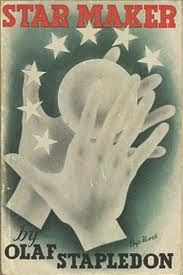 William Olaf Stapledon, son of William Clibbert Stapledon and Emmeline Miller, was born in Seacombe, Wallasey, England on 10 May 1886. In 1919 he married his cousin Agnes Zena with whom he had two children: Mary Sydney and John David. Stapledon died in Caldy, England on 6 Sep 1950.
William Olaf Stapledon, son of William Clibbert Stapledon and Emmeline Miller, was born in Seacombe, Wallasey, England on 10 May 1886. In 1919 he married his cousin Agnes Zena with whom he had two children: Mary Sydney and John David. Stapledon died in Caldy, England on 6 Sep 1950. His writings directly influenced many authors, contributing a number of ideas to the world of science fiction. The "supermind" composed of many individual consciousnesses forms a recurring theme in his work. "Star Maker" contains the first known description of what are now called Dyson spheres. Freeman Dyson credits the novel with giving him the idea, even stating in an interview that "Stapledon sphere" would be a more appropriate name. "Last and First Men" features early descriptions of genetic engineering and terraforming. "Sirius" describes a dog whose intelligence is increased to the level of a human being's.
Stapledon's fiction often presents the striving of some intelligence that is beaten down by an indifferent universe and its inhabitants who, through no fault of their own, fail to comprehend its lofty yearnings. It is filled with protagonists who are tormented by the conflict between their "higher" and "lower" impulses. According to Gregory Benford, it also reflects his Marxist political views, (though Stapledon himself explicitly rejected Marxism) as well as then-contemporary intellectual fashions (e.g. the belief in extrasensory perception).
"Last and First Men," a future history of 18 successive species of humanity, and "Star Maker," an outline history of the Universe, were highly acclaimed by a diversity of figures from Virginia Wolf to Winston Churchill. In contrast, Stapledon's philosophy repelled C. S. Lewis, whose "Cosmic Trilogy" was written partly in response to what Lewis saw as amorality, although Lewis admired Stapledon's inventiveness and described him as "a corking good writer". In fact Stapledon was an agnostic who was hostile to religious institutions, but not to religious yearnings, a fact that set him at odds with H. G. Wells in their correspondence.
None of Stapledon's novels or short stories have been adapted for film or television, although George Pal bought the rights to "Odd John." In 1966 Castle of Frankenstein magazine reported that David McCallum would play the title role.

